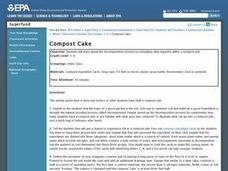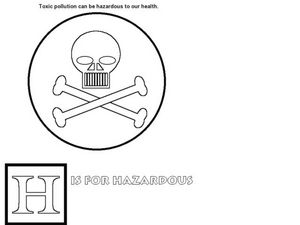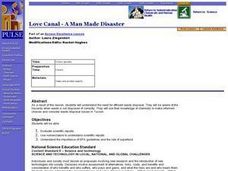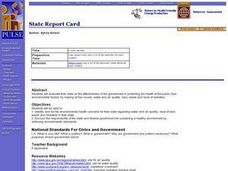Curated OER
Letting Off Steam
Learners examine the concept of transpiration. They work together to complete an experiment in which they see water loss in plants. They record their observations and discuss their conclusions.
Curated OER
Buried Treasure
Students examine the role of micro and macro organisms in the decomposition process. They record their observations and discuss. They also read a book about decomposition.
Curated OER
Soil Soakers
Students work together to discover the relationship between water holding and drainage characteristics of soils. They record their observations and discuss the results. They examine particle size and pore sizes as well.
Curated OER
Compost Cake
Learners examine the decomposition process. They create their own class compost pile and record their observations. They discover which materials decompose at a different rate.
Curated OER
Paper Making
Learners work together to make recycled paper. They identify examples of recycled materials and discover what can and cannot be recycled. They explore the history of paper making as well.
Curated OER
Dress Up a Twig
Students study the structure and function of the parts of a winter twig. They determine how to identify trees using the twigs.
Curated OER
Water Cycle Relay
Students review the steps in the water cycle by playing a game to fill in the missing words in the cycle. Students read a water cycle riddle and decide which word best fits the riddle.
Curated OER
Twig Match
Students practice observing and identifying the characteristics of twigs. They attempt to identify trees after their leaves have fallen off. They describe the twigs and participate in a matching activity with the twigs and student...
Curated OER
The Numbers Game
Students examine how to calculate the part-per-million and part-per-billion units used to measure contaminant concentrations in the environment. They calculate ratios, take a quiz, analyze a sample chemical spill, and determine if...
Curated OER
Pollution Prevention
Students investigate how to reduce solid and hazardous waste, and estimate the amount of household hazardous waste in their community. Students discuss methods of changing people's habits, and how to convince them to use alternative...
Curated OER
Pollution Solutions
Students participate in a hands-on activity to determine how water is polluted and investigate steps in how to treat water. Students try to produce the cleanest water possible using the materials provided.
Curated OER
One in a Million
Learners participate in an experiment to demonstrate how a substance can have different concentrations in a solution. Students record observations on a dilution chart and determine the concentations of various parts per million.
Curated OER
Zigzag Seeds
Students observe the effects of gravity on seeds. Students place seeds in various orientations and record their growth to determine how gravity affects the seeds' growth.
Curated OER
Science: A-maze-ing Plants
Students discover how light helps plants to grow. By placing a plant inside a box cut into a maze, they observe how the plant finds its way through the maze to the light source.
Curated OER
The Rotten Truth
Pupils study the process of decomposition using lunch leftovers and soil. They complete the inquiry over set periods time as they observe the how composting takes place and finally, they sort the materials into biodegradable,...
Curated OER
H is for Hazardous
In this toxic materials activity, students read the sentence about toxic pollution. Students then may color the picture of the skull and crossbones. Students color and read 'H is for Hazardous.'
Curated OER
B is for Bulldozer
In this pollution worksheet, students read the sentences 'Bulldozers remove polluted dirt,' and 'B is for Bulldozer.' Students may color the picture of the bulldozer.
Curated OER
G is for Groundwater
In this groundwater worksheet, students read the sentences 'Groundwater is beneath the soil,' and 'G is for Groundwater.' Students may color the picture of the groundwater image.
Curated OER
D is for Dump
In this pollution worksheet, students read the sentences 'Don't dump pollution in the water,' and 'D .' Students may color the picture of the no dumping image.
Curated OER
C is for Community
For this environmental protection worksheet, students read the sentences 'The community words together to clean up the environment,' and 'C is for community.' Students then color the picture related to community and the environment.
Curated OER
Love Canal-A Man Made Disaster
Students watch a "Waste Management" Power Point as well as a "Love Canal" PowerPoint (a link is provided for the second presentation). Students write the chemical formula for each chemical and convert the contamination to grams using...
Curated OER
Ethics In The Science Classroom - The Landfill
Students discuss the risks a landfill may pose to a community. The setting is a school board faced with a decision about whether to close a school until the landfill is capped (a 3 year period). They are asked to determine how they would...
Curated OER
State Report Card
Twelfth graders evaluate their own state on how well the government protects their citizens from specific health issues. In groups, they list the environmental health concerns regarding water, air, toxic waste and radiation. They...
























